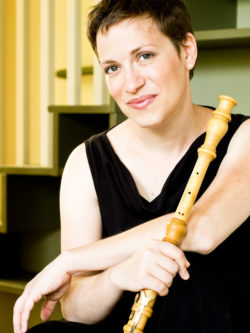by Daniel Hathaway

We reached Debra Nagy in Berkeley, California. She was on the West Coast fulfilling one of her many guest gigs with early music ensembles nationally and abroad. In Cleveland, she is artistic director of the French Baroque ensemble Les Délices.
Daniel Hathaway: What takes you to Berkeley this time?
Debra Nagy: I’m playing with the American Bach Soloists. It’s a big French Baroque program of grand motets and orchestral music, similar to what I want to do with Les Délices in a collaboration with Quire Cleveland next spring.
DH: Tell me about Bach’s g-minor oboe concerto.
DN: It’s basically the f-minor harpsichord concerto in an adaptation by a German friend of mine.
DH: Is this your first concerto appearance with Apollo’s Fire?
DN: A few years ago, we paired the last movement of this concerto with a g-minor sinfonia, and I’ve played the Bach double concerto for violin and oboe with the ensemble.
DH: How did you come to take up the oboe to begin with?
DN: I always think that the best things happen to us by accident. I started playing oboe at age nine in the fourth grade, but only because a wonderful public school music teacher thought enough of me to put it into my hands. I always appreciated the opportunity to “individuate” myself from my peers. The idea of being the only one — rather than one in a sea of flutes, clarinets, or even saxophones — appealed to me. It was a good way to go.
DH: And before the oboe?
DN: Clarinet was my first instrument, but I arrived at high school as an oboe player. My school had a very strong marching band and jazz program. The band director called me up the summer before my freshman year and said, ‘I know you play the oboe, and you’re wonderful at that, but you need to play something in the marching band.’ The two options he gave me, since he knew I had some piano skills, were that I could play the glockenspiel, or a new soprano saxophone they had just acquired. I said, thank you very much, but I won’t be carrying 50-pound bells around. I’ll take the saxophone. I only played it for a couple of years before I got really serious about the oboe.
The Baroque oboe came along later, also somewhat by accident. I had just finished my first year at Oberlin and I was going to be working all summer at my work-study job in the piano shop. I admitted a little bit despondently to my teacher, James Caldwell, that I was going to be in the basement workshop all summer and not so much engaged with music. He said, ‘Well, at the very least, you could come to the Baroque Performance Institute. We’ll give you a scholarship, and even if you hate the Baroque oboe and never want to play it again, it’ll help your modern oboe playing.’ It seemed like an offer I’d be stupid to refuse, and as they say, the rest is history.
DH: At what point did you definitively give up the modern oboe?
DN: Very, very quickly, to be honest. I had to finish my senior year as a modern oboe player, but I was essentially splitting my time half and half. I knew I was just waiting to finish. I haven’t played the modern oboe since 2001, and I haven’t owned one since maybe 2007. I finally sold it.
DH: What does your instrument collection include at the moment?
DN: It’s huge. I own more than twenty instruments. Quite a few of them are recorders, but I have seven or eight oboes at different pitches and in different keys, including oboi d’amore in A, taille in F, and a couple of different classical oboes. I’ll be playing what I call my bread-and-butter oboe for Apollo’s Fire. It’s a copy of an instrument from London around 1720, which actually makes it a Handel oboe. The original maker’s name was Jonathan Bradbury, and the copy was made by Randy Cook, an American who settled in Basel quite a number of years ago.
DH: Of course, one of the lifelong obsessions among oboe players is reeds. What do you do about reeds for those different oboes?
DN: Every one of them requires its own reed.
DH: What a nightmare! Or do you enjoy reed making?
DN: I wouldn’t say that I enjoy it, but I also don’t have to maintain all those instruments simultaneously. I’m a great believer in compartmentalization. I’ve actually been playing classical oboe exclusively for the last five weeks. It’s a shift for me going back to the lower pitch in preparing for next week.
DH: What does that do to your ear?
DN: I don’t have perfect pitch, so I adjust pretty easily. It’s actually more about the physicality and the different sound, the different resistance and the different requirements of the instruments. The spacing of holes is different, and different instruments have more or fewer keys. It’s like variations on a theme. I don’t accentuate the differences, otherwise I’d feel a little paralyzed!
Published on ClevelandClassical.com February 15, 2017.
Click here for a printable copy of this article


